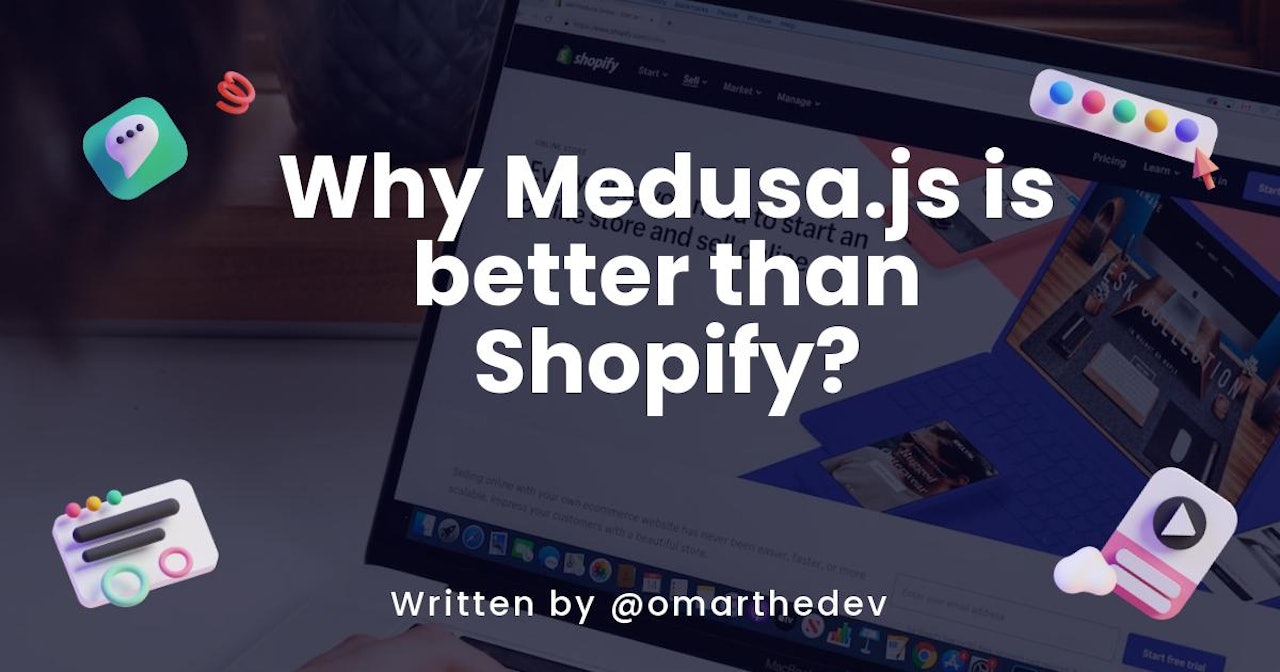Did you hear about Medusa.JS recently? It's a Shopify ✨ alternative, but you might ask, why Medusa.js is considered much more efficient and better than Shopify although Shopify is more popular and easy to use?
So let's negotiate about this, we will conclude here the main 5 reasons!
1 - Code Availability
Unfortunately, Shopify isn't open-source while Medusa.js is completely open-source! Being open-source grabs more developers to contribute to improve the project for the public, while other projects which aren't open-source receive less users probably + less contributions which means slower updates.
2 - Easy-to-setup for users/developers
Medusa.js got docs for how to setup your new Medusa.js ecommerce store, where it's completely detailed and updated frequently if something goes out-of-date, while Shopify might seem more complicated to setup and make it live on the internet, Medusa.js needs a few requirements which are easy to setup by developers & users, just need to setup a simple database, MedusaJS will get it ready and put all the data, a Redis server, and a few more, then you just config the enviroment variables, run everything using npm or yarn and you won't need to code further again!
3 - Useful documentation and Discord Community
Support is important for users and developers too, MedusaJS got really useful docs which you can find at https://docs.medusajs.com which is really helpful, also a Discord community where you can ask for help, or just chat with other developers 👨💻 !
Join Medusa.JS Discord Community now!
While Shopify got direct support like Live Chat and a Community where you can get a bit of delay in replies. Although Shopify got developer docs, MedusaJS covers more in their docs more than Shopify.
 View Website
View Website
 View Website
View Website
 View Website
View Website
4 - Developer APIs
Shopify comes with different APIs that let developers build applications and integrations on top of Shopify. Shopify APIs offer merchants customization and efficiency, as well as a better shopping experience for customers.
Medusa also comes with REST APIs (my favorite 😎) which gives you more flexibility when optimizing your storefront. You have the freedom to choose your frontend framework (like Next.js, Gatsby, even more starters are coming soon, but you are free to choose your favorite framework) and connect to Medusa, and that's it 😊!
5 - Site Performance
Site performance is a measure of how rapidly your e-commerce website’s pages load and display in a browser. Faster websites make for more conversion rates, attract more mobile shoppers and make more sales.
Shopify hosts your online store on fast global servers, which doesn’t limit your store’s bandwidth. Certain factors can still limit your site’s performance like additional apps, features and custom integrations. You sacrifice speed when you add apps to change the appearance or functionality of your online store. One solution to this is by disabling app features that you don’t need when using Shopify.
Medusa’s headless design frees up the frontend from the constraints of the backend. This means your store loads independently of the backend and only communicates with it to retrieve or post data thereby improving the site’s performance. Also, any other additional features or custom integrations that you may want are added as plugins to your Medusa server. This way they won’t impair your site’s performance.
Conclusion
Both Medusa and Shopify have their perks and make a good choice for different use cases.
~ When to choose Shopify:
- Merchants with no-technical knowledge looking to create their ecommerce store.
- Businesses that “just want to get started quickly” with an easy solution to set up
- Businesses that are looking for a simple setup with limited customizations to it
~ When to choose Medusa:
- Developers that want full control over the ecommerce platform’s codebase, integrations and cusomizations.
- Businesses that are looking for a scalable platform where they can own the entire user experience and avoid replatforming down the road
- Businesses that were anyway considering building an ecommerce solution from scratch, but prefer a solid starting point.


Comments (0)